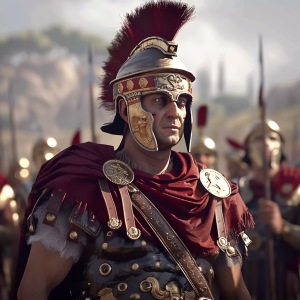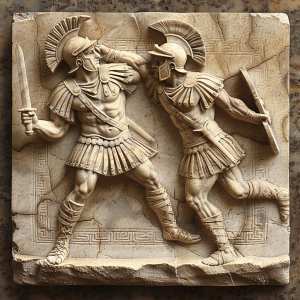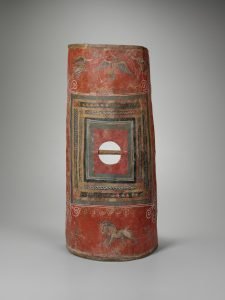The many simplified representations of the Roman army uniform that have been made in the past have contributed to misrepresenting it as a unique “official” uniform.

Was there an official Roman Army Uniform?
The notion of uniforms barely existed in Roman times. The army’s equipment was rather heterogeneous, varying from the slingers’ leather or metal protections to the elite legionaries’ heavy armoured protections. Numerous differences existed. It seemed as if each cohort of centurion took their own approach to the decoration of their equipment.

How do we know what the Roman Army Uniform looked like?
The simplification of Roman army uniform has its origins in the way the Romans themselves stylized their representations on the bas-reliefs. These bas-reliefs are still present today in Trajan’s column.

Furthermore, the ancient Romans’ reference to Greece and its legendary past accounts for the graphic Hellenization of the soldiers.
Afterwards, while referring to the Arch of Constantine or Trajan’s column, neoclassical painters and sculptors copied and faithfully reproduced the sources they had at their disposal. This contributed to creating a sort of “fictitious” Roman soldier equipped with a helmet and armour which were historically inaccurate.
A good example of this is the painting aptly titled, ‘Vercingetorix throws down his arms at the feet of Julius Caesar’. This was the work of the French painter, Lionel Royer, in 1899.

What are the Archaeological findings about the Roman Army Uniform?
Archaeological research has proven that Roman equipment has evolved over the centuries along with the resources and the battle skills.
However, leather made up most of the Roman army’s armour. Leather, unlike metal, will erode to nothing after only a short time in the dirt. Consequently, Roman army armour left behind little proof of existence. This is also consistent with scrutum(shields). Most shields were made from wood and canvas. They would eventually rot away to nothing.
Nonetheless, one surviving example exists. A semicylindrical shield known as a scutum, used by Roman legionaries. This piece of history is present at the Yale Art Gallery.

Contrarily, Hollywood filmmakers preferred to ignore this and kept the 19th-century model, thus contributing to setting an oversimplified image of the Romans and the Gauls.

If you are interested in ancient Rome, why not check out this graphic novel Conquest: Julius Caesar’s Gallic Wars? Conquest is an epic graphical retelling of Julius Caesar’s conquest of Gaul between 52 B.C. and 49 B.C.


Need an excuse to get awesome graphic novels? Take 50% off
1. Sign up with your name and email address.
2. Check your inbox for your discount code.
3. Take 50% off your first order at www.blackpanelpress.com
You have Successfully Subscribed!